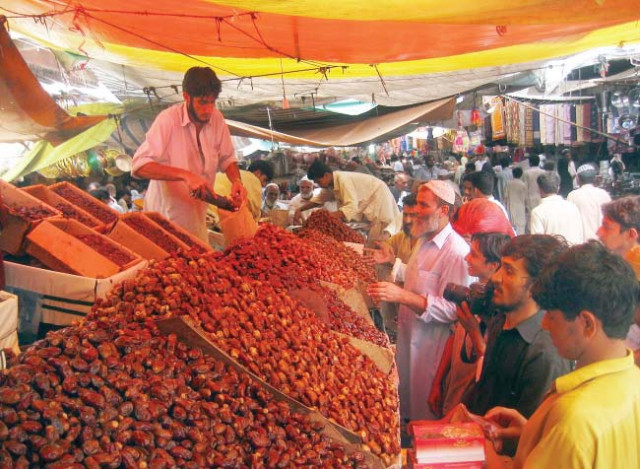Punjab govt fails to bottle up inflation genie
Despite price cut, rates of several commodities have jacked up

Official statistics show that food inflation fell in the second half of 2018. photo: PPI
Reportedly, fair price shops will sell daily use commodities at subsidised rates and funds worth billions of rupees have been issued in this regard. Just like every year, the Punjab government sought a report from all district administrations in the province in regard to setting up Ramazan bazaars.
Fair price shops will be provided Rs320 million in subsidies by the government. Other districts have also predicted expenses between Rs70 million and Rs120 million. Mayors, district chairmen and municipal committees have been removed from this process.
However, in the absence of an effective price control mechanism, prices of all essential commodities have continued to skyrocket ahead of Ramazan.
Survey of various city markets and weekly Sunday bazaars indicated that provincial and city administrations have left citizens at the mercy of ruthless traders who were fleecing citizens in broad daylight by overcharging. Prices of all eatable commodities, pulses and grains have been jacked up in gross violation of notified price lists and profiteering laws.
'Erasing the poor': Pakistanis feel crunch of rising prices
Speaking to a select group of journalists on Sunday, Lahore Deputy Commissioner Saleha Saeed said the city administration was taking strict action against profiteering and hoarding. On citizens’ complaint, she highlighted, some 15 officials of the price control teams have been de-notified. The city administration has appointed 25 new officials in their place after imparting them a two-day short training. “The city administration is tirelessly working to give relief to common citizens during the holy month. Heavy penalties were being imposed on profiteers and hoarders,” she added.
Meanwhile, in Sunday bazaars and open markets vendors kept selling fresh fruit and vegetables at the asking price. In some areas, citizens also complained about the sale of substandard and low-quality products. A citizen, Ehsan Elahi, pointed out that most vendors in weekly makeshift markets are selling second or third grade fruits and vegetables at a premium price. He also pointed out several seasonal commodities are missing in makeshift markets.
Price comparison showed that though the price of potatoes remained unchanged at Rs10-12 a kilogramme since last week on most stalls low quality or blended potato varieties were sold in Sunday bazaars, while in open market potato is sold for Rs18-25 a kilogramme in violation of official price list.
Azhar admits rising inflation during PTI’s first 200 days
The price of onion witnessed a surge of Rs10 as its price was fixed at Rs40-42 a kilogramme. However, it was traded for Rs55-60 a kilogramme in open market and Rs42 in Sunday bazaars.
Tomato price showed an increase of Rs5 a kilogramme and settled at Rs62-65. Garlic local was reduced by Rs5 a kilogramme, fixed at Rs92-97 a kilogramme, sold at Rs100 to Rs120 a kilogramme, garlic (Chinese) also gained Rs10 a kilogramme, fixed at Rs193 to Rs202 a kilogramme, not available there, and garlic hernaiy was fixed at Rs126 to Rs132 a kilogramme, sold at Rs200 a kilogramme.
Ginger Chinese increased by Rs8 a kilogramme, fixed at Rs 192 to 200 a kilogramme, not sold, Garlic Thai fixed at Rs161 to Rs168 a kilogram, sold at Rs 200 a kilogramme.
Cucumber farm white was fixed at Rs24 to Rs26 a kilogramme, sold at Rs50 a kilogram and black at Rs34 to Rs36 a kilogramme, sold at Rs 40 a kilogramme, while cucumber desi rates were issued Rs100 a kilogramme.
Biter gourd farm was fixed at Rs34 to Rs36 a kilogramme, while it was being for sold at Rs60 a kilogramme, and local was fixed at Rs54 to Rs56 a kilogramme, not available.
Green pea was fixed at Rs31 a kilogramme, sold at Rs200 a kilogramme.
Published in The Express Tribune, April 29th, 2019.



















COMMENTS
Comments are moderated and generally will be posted if they are on-topic and not abusive.
For more information, please see our Comments FAQ